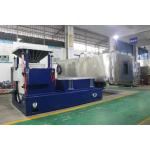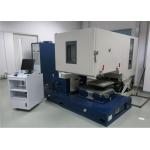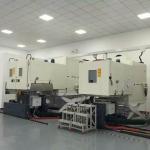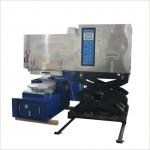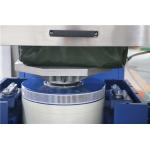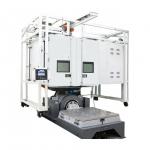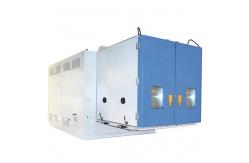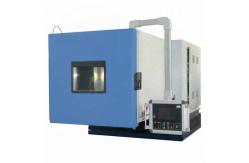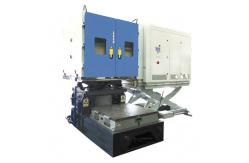In the highly competitive and technologically advanced electrical
industry, ensuring the reliability and durability of products is of
paramount importance. The customized vibration test system combined
with a climate chamber, designed to meet ASTM D4169-16 standard,
offers a comprehensive and accurate solution for evaluating the
performance of electrical components and devices under a wide range
of environmental and mechanical stress conditions. This advanced testing apparatus is specifically engineered to
subject electrical products to a combination of vibration and
climatic stresses as per the requirements of ASTM D4169-16. It
serves the electrical manufacturing industry, including companies
involved in the production of consumer electronics, industrial
electrical equipment, and telecommunications devices. The primary
objective is to replicate the real-world conditions that electrical
products may encounter during transportation, storage, and
operation. By conducting tests in accordance with this standard,
manufacturers can identify potential weaknesses, optimize product
designs, and ensure compliance with industry regulations and
customer expectations. - Robust and Modular Chamber Construction
- The climate chamber is built with a heavy-duty steel frame that
provides exceptional rigidity and stability. The frame is coated
with a corrosion-resistant finish to enhance its longevity. The
chamber walls are made of high-quality insulation materials, which
minimize heat transfer and maintain precise temperature and
humidity levels. The insulation is carefully selected to withstand
the rigors of continuous testing and prevent any external factors
from interfering with the internal test environment. The chamber is
also equipped with a hermetic door seal, ensuring a leak-free
enclosure and consistent test conditions. The modular design allows
for easy customization and integration of different components,
such as the vibration test system.
- Precision Temperature and Humidity Control System
- The chamber features a highly accurate temperature and humidity
control system. It can maintain a wide temperature range, from
-40°C to +180°C, with an accuracy of ±0.5°C. The humidity control
range extends from 10% to 98% relative humidity, with an accuracy
of ±2% RH. The system utilizes advanced refrigeration units,
electric heaters, humidifiers, and dehumidifiers to achieve and
maintain the desired environmental conditions. Temperature and
humidity sensors are strategically placed within the chamber to
provide real-time feedback, enabling the control system to make
rapid and precise adjustments.
- High-Performance Vibration System
- The integrated vibration test system is capable of generating a
wide range of vibration frequencies and amplitudes. The frequency
range can span from 2 Hz to 2000 Hz, allowing for the simulation of
various real-world vibration sources, such as machinery operation,
transportation vibrations, and seismic activity. The vibration
amplitude can be adjusted from a few micrometers to several
centimeters, depending on the test requirements. The vibration
system is equipped with a rigid vibration table and a high-torque
motor, ensuring uniform and stable vibration transmission. It also
features advanced control algorithms that enable the creation of
complex vibration profiles, including random vibrations, sine
waves, and shock pulses.
- Synchronized Control and Data Acquisition
- The system is equipped with a sophisticated control panel that
allows for seamless synchronization of vibration and climatic
parameters. Operators can precisely program the sequence and
intensity of vibrations, temperature changes, and humidity levels,
creating custom test profiles that meet ASTM D4169-16 requirements.
The control panel also provides real-time monitoring of all test
parameters, including temperature, humidity, vibration frequency,
amplitude, and sample status. The data acquisition system records
detailed information about the test, such as temperature and
humidity profiles, vibration waveforms, and any changes in the
physical properties of the electrical sample. The acquired data can
be stored in a variety of formats and analyzed using specialized
software to generate comprehensive test reports.
- Compliance with ASTM D4169-16 Standard
- The equipment is specifically calibrated and programmed to perform
tests in strict accordance with ASTM D4169-16. It can replicate the
various vibration profiles, temperature and humidity cycles, and
test durations specified in the standard. This ensures that the
test results are valid and comparable, allowing manufacturers to
make informed decisions about product design, material selection,
and quality control. The chamber also provides a means for
documenting compliance with the standard, which is essential for
product acceptance in the electrical industry.
- Vibration Frequency Range
- As mentioned, the vibration frequency range of 2 Hz to 2000 Hz
covers a wide spectrum of vibrations that electrical products may
experience. Low-frequency vibrations can affect the stability and
alignment of larger components, while high-frequency vibrations can
cause fatigue and failure in smaller, more delicate parts. Testing
across this frequency range ensures a comprehensive evaluation of a
product's performance under different vibration scenarios.
- Vibration Amplitude Range
- The vibration amplitude can be adjusted from a few micrometers to
several centimeters. This flexibility allows for the simulation of
both mild and severe vibration conditions. For example, a small
electronic circuit board may require a relatively small vibration
amplitude to test its resistance to the vibrations of a delivery
van, while a large industrial electrical enclosure may need to be
tested at a higher amplitude to simulate the rough handling it
might receive during shipping.
- Temperature Cycling Range
- The chamber can perform temperature cycling within the range of
-40°C to +180°C. This wide temperature range is crucial for testing
electrical products that may be used in extreme climates or
industrial environments. For instance, components used in outdoor
power generation equipment may need to withstand high temperatures,
while those in cold storage facilities or arctic applications may
face extremely low temperatures. Temperature cycling also helps to
evaluate the thermal expansion and contraction characteristics of
products and their potential impact on performance and reliability.
- Humidity Cycling Range
- The humidity cycling range of 10% to 98% relative humidity enables
the assessment of product performance under different moisture
levels. High humidity can cause condensation, corrosion, and other
moisture-relat
|
